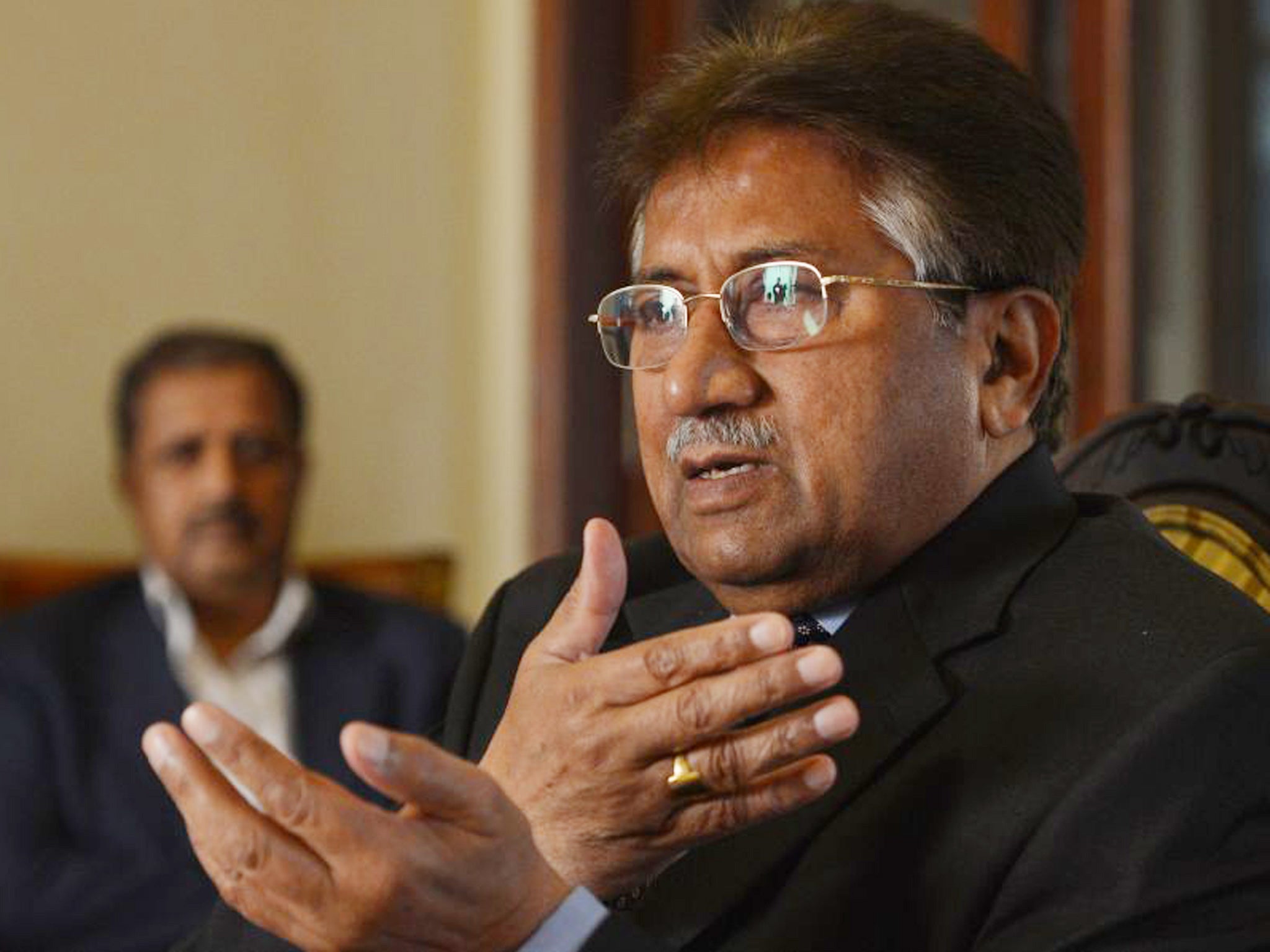Pakistan's former leader Pervez Musharraf pleads not guilty to high treason
Charges carry the death penalty, should the trial proceed that far

A court in Pakistan has rejected a plea from former military ruler Pervez Musharraf to travel abroad to visit his ailing mother after he appeared to deny charges of high treason.
In a development that underscored the fall from grace the former dictator has suffered since he returned to Pakistan a year ago, a court in Islamabad formally indicted him on five counts.
It is the first time in Pakistan’s history, much of which has been dominated by army rule, that a military leader has faced such charges. They potentially carry the death penalty, should the trial proceed that far.
The 70-year-old’s lawyer, Farogh Naseem, told The Independent that his client had pleaded not guilty to the allegations put to him on Monday morning. He also said the court had made clear he was not being charged with treason in the normal sense but for alleged mis-governance and breach of the constitution. “He pleaded not guilty to all five charges,” he said.
Mr Musharraf returned to Pakistan in 2013 in order to contest in the general election held last May. Ignoring warnings from many sources that support for him on the ground was at best modest and that he faced a series of legal cases, he flew into Karachi only to see himself embroiled with those actions in various courts.
Since January, Mr Musharraf has been kept in a military hospital in the city of Rawalpindi having been taken there after complaining of chest pains while on route to a hearing. He apparently appeared in court in Monday against the advice of his doctors.
In court, Mr Musharraf stood and spoke for 30 minutes, defending his time as president and dismissing the allegations levelled at him.
“I am being called a traitor. I put the country on the path of progress after 1999 when the country was being called a failed and a defaulted state,” he said, according to the Associated Press. “Is this the way to reward someone for being loyal to the country and for loving the country?”
The former military leader seized power in 1999 when he led a coup against Nawaz Sharif, who was Pakistan’s Prime Minister at the time and who was reelected to that position last May. Mr Musharraf eventually resigned in the summer of 2008 and left Pakistan, spending much of his time in London and Dubai.
The allegations of high treason relate to his decision to declare a state of emergency in November 2007 and detain a number of judges, including the then chief justice Iftikhar Chaudhry.
The prosecution of Mr Musharraf marks a step into new, uncharted territory for Pakistan, where the army has always been seen as being largely untouchable. Even though senior officers warned Mr Musharraf not to return to Pakistan last year, the military will not want to see its former leader humiliated.
Mr Musharraf’s legal team on Monday had asked permission for the former ruler to be permitted to leave Pakistan to visit his 95-year-old mother, who is being treated in Sharjah, in the United Arab Emirates. It asked that his name be removed from the country’s so-called Exit Control List.
For months, there has been speculation that Mr Musharraf would leave Pakistan for his own medical reasons. As it was, the court denied the request, saying it was up to the government to decide if the former military ruler could leave.
While there are many many who wish to see him charged, the prosecution creates a potential headache for Pakistan’s establishment. There is speculation that once a trial starts, Mr Musharraf might “name names” when he addresses the court. Among those who could become implicated are former army chief, General Ashfaq Parvez Kayani, who was vice chief of the army staff when Mr Musharraf imposed the emergency.
Many had believed his departure from Pakistan on medical grounds might defuse such a crisis.
“This means the trial will continue. It seems the government of Nawaz Sharif is intent on prosecuting him,” said Hasan-Askari Rizvi, a strategic analyst. “The military would like that he gets a safe exit. That way the story is closed.”
Subscribe to Independent Premium to bookmark this article
Want to bookmark your favourite articles and stories to read or reference later? Start your Independent Premium subscription today.

Join our commenting forum
Join thought-provoking conversations, follow other Independent readers and see their replies